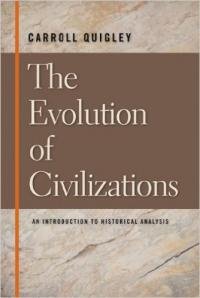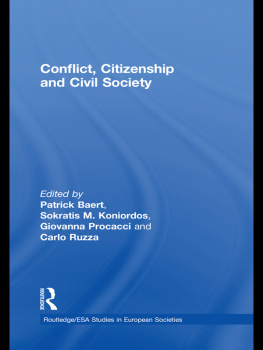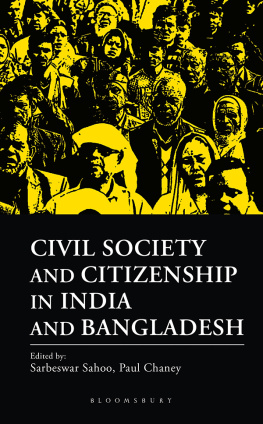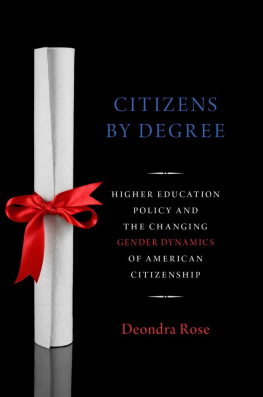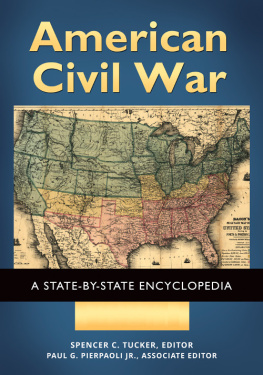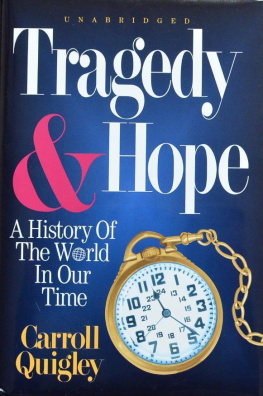Published by Louisiana State University Press
Copyright 2018 by Louisiana State University Press
All rights reserved
Manufactured in the United States of America
First printing
DESIGNER: Barbara Neely Bourgoyne
TYPEFACE: Ingeborg
PRINTER AND BINDER: TK
Library of Congress Cataloging-in-Publication Data are available at the Library of Congress.
ISBN 978-0-8071-6863-9 (cloth: alk. paper)ISBN 978-0-8071-6864-6 (pdf)ISBN 978-0-8071-6865-3 (epub)
The paper in this book meets the guidelines for permanence and durability of the Committee on Production Guidelines for Book Longevity of the Council on Library Resources.

ACKNOWLEDGMENTS
This volume began to germinate at a conference in Blacksburg in April 2015. The Civil Warera history of citizenship had long intrigued me, developing into a scholarly itch I couldnt quite figure out how to scratch. I found it difficult to imagine a single research project doing justice to such a complex, multifaceted subject. Collaboration was the obvious answer. The best way to scratch the itch, it turned out, was to assemble a group of experts who could bring a variety of perspectives and methods to bear on the knotty problem of what citizenship meant and how it changed during the Civil War era.
Twenty-four speakers from across the United States and Europe participated in the conference, and for three days we explored our subject from a rich assortment of angles. I take great pleasure in thanking everyone who made the conference such a success: the panel chairs and the presenters, who ranged from graduate students to senior professors in both law and history; keynote lecturers Laura Edwards and Steven Hahn; graduate assistant Kristin Carlson; the staff at the Inn at Virginia Tech; and donors to the Virginia Center for Civil War Studies, which sponsored the event.
Its been a privilege to work with LSU Press to turn the project into a book. I especially appreciate the support and encouragement of Mike Parrish and Rand Dotson. An anonymous reviewer made a number of thoughtful suggestions that have improved the final product, while editor Lee Sioles did a fine job taking the manuscript through the final stages.
Most of all, I am grateful to the essay authors, who cheerfully met deadlines, made multiple rounds of edits, and worked hard to ensure that their disparate topics engaged with common themes. Thanks to you all for making this such a rewarding experience.
The Civil War and the Transformation of
American Citizenship
Introduction

PAUL QUIGLEY
What is citizenship? It is a concept we are all familiar with, but one that can be maddeningly difficult to define neatly. Across the modern world, citizenship has become central to the formation and the operation of the democratic nation-state. At its most simple, it is a fixed legal status that we acquire through birth or naturalization. It provides access to a clearly defined set of rights and obligationsthe right to enter certain territory or to claim certain resources, the obligation to pay particular taxes or perform national service. We either possess it or we do not. Yet for all its apparent specificity and rigidity, in practice citizenship can be a remarkably capacious, fluid concept. It encompasses not only legal and political but also social and economic rights and obligations. It frequently involves a sense of cultural belonging to a bounded community. Citizenship changes over time and space, and it overlaps with other forms of loyalty and status. And so, the question remains: What is citizenship?
If citizenship is complex today, it was still more so in the era of the American Civil War. In 1862 even US Attorney General Edward Bates found it impossible to provide a precise definition of US citizenship, which was, as he put it, now as little understood in its details and elements, and the question as open to argument and speculative criticism as it was at the beginning of the Government. If even the attorney general was confused by the elusiveness of the concept, what hope did ordinary Americans have?
The concept of citizenship would become somewhat clearer with the constitutional amendments that followed the Civil War, particularly with the adoption of the Fourteenth Amendment in 1868. Previously, citizenship had been defined at the state level, except in the case of naturalized immigrants. The original Constitution and the Bill of Rights had delineated rights and obligations of the people and had rested, largely implicitly, on the Founders vision of a nation-state operated by citizens. Now, the Fourteenth Amendment explicitly established a new category of national citizenship with these words: All persons born or naturalized in the United States, and subject to the jurisdiction thereof, are citizens of the United States and of the state wherein they reside. This new definition pointedly included African Americans, reversing the racial exclusiveness of prewar American citizenship that had been exemplified by the Supreme Courts 1857 Dred Scott decision. It also reflected the immense sacrifice of human life between 1861 and 1865, a sacrifice that began by threatening the very survival of emerging notions of citizenship and ended in refining the concept and making it more relevant than ever. Clearly, the crises of the Civil War and emancipation drove Americans to define citizenship with greater inclusivity and greater precision.
Yet we must look well beyond the Fourteenth Amendment to understand this process fully. The development of new concepts of citizenship involved Americans far from Washington, DC: Americans northern and southern, male and female, black and white, immigrant and native-born. This was not simply the top-down imposition of new legal rules. Instead, it was a collaborative and wide-ranging reassessment of the many meanings of citizenship in the United States. Constitutional law was important, but it was just one dimension among many.
The essays in this book explore many dimensions of this expansive process from a wide range of perspectives. What the essays share is the aim of understanding how Civil War Americans used citizenship to articulate and contest different visions of what America was and what it ought to be; who belonged and who did not. Together, they reveal deep connections among the central problems of the Civil War: the place of white southerners within the Union and the place of African Americans within American society and politics. We often separate these two issues, but of course they were tightly intertwined. The debate over citizenshipwhat it meant, who could claim it, who ultimately arbitrated itwas a common thread running through Civil War Americans otherwise disparate experiences and agendas. To be sure, they used the concept in different ways and to different ends. But for everyone, citizenship provided a capacious, flexible language with which to advance their own prioritieswhether they were black women using the law to secure ownership of their own bodies or Confederate POWs agonizing over whether to take the oath of allegiance; whether they were Confederate veterans reimagining citizenship along economic lines or black firemen claiming new political rights and new access to public space. Ultimately, this volume clarifies the fundamental issue that all Americans fought over throughout the Civil War and Reconstruction years: What did citizenship mean and who got to define it?









